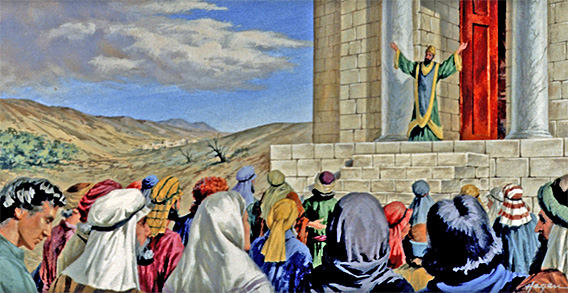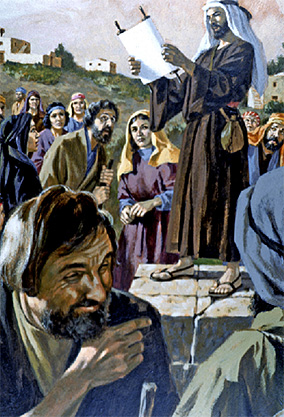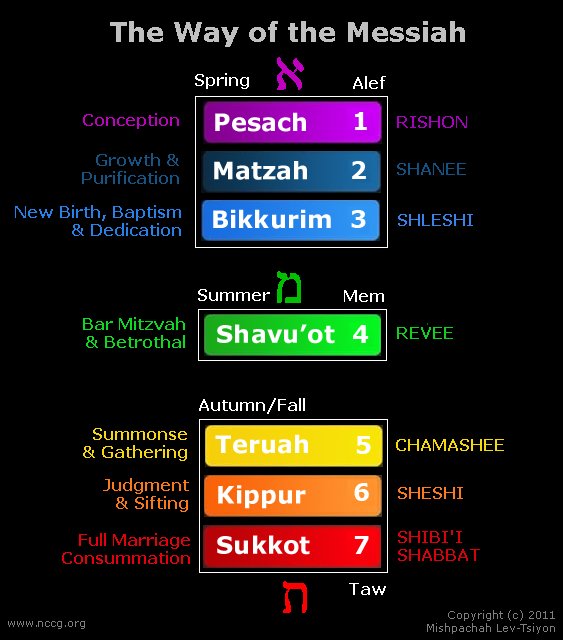Month 1:23, Week 4:1 (Rishon/Pesach), Year:Day 5936:023 AM
Gregorian Calendar: Saturday 14 April 2012
Secret of the Late Pesach
Yahweh's Provision for a Second Passover

The Torah generously provides for those who, through no fault of their own, were unable to partake of the mandatory Pesach meal in the first month of Aviv:
"Then Yahweh spoke to Moses, saying, 'Speak to the children of Israel, saying: 'If anyone of you or your posterity is unclean because of a corpse, or is far away on a journey, he may still keep Yahweh's Pesach (Passover). On the fourteenth day of the second month, at twilight, they may keep it. They shall eat it with unleavened bread and bitter herbs. They shall leave none of it until morning, nor break one of its bones. According to all the ordinances of the Pesach (Passover) they shall keep it. But the man who is clean and is not on a journey, and ceases to keep the Pesach (Passover), that same person shall be cut off from among his people, because he did not bring the offering of Yahweh at its appointed time; that man shall bear his sin" (Num.9:9-13, NKJV).
If you fail to observe Pesach the first time, you are not only obliged to keep it in the second month too but also the entire days of Chag haMatzah (Feast of Unleavened Bread) and, by extension, mark Yom haBikkurim (Day of Firstfruits) too as King Hezekiah did when his people failed to have everything organised properly in time in Aviv:
"And Hezekiah sent to all Israel and Judah, and also wrote letters to Ephraim and Manasseh, that they should come to the house of Yahweh at Jerusalem, to keep the Passover to Yahweh-Elohim of Israel. For the king and his leaders and all the congregation in Jerusalem had agreed to keep the Passover in the second month. For they could not keep it at the regular time, because a sufficient number of cohenim (priests) had not consecrated themselves, nor had the people gathered together at Jerusalem. And the matter pleased the king and all the assembly. So they resolved to make a proclamation throughout all Israel, from Beersheba to Dan, that they should come to keep the Passover to Yahweh-Elohim of Israel at Jerusalem, since they had not done it for a long time in the prescribed manner. Then the runners went throughout all Israel and Judah with the letters from the king and his leaders, and spoke according to the command of the king: 'Children of Israel, return to Yahweh-Elohim of Abraham, Isaac, and Israel; then He will return to the remnant of you who have escaped from the hand of the kings of Assyria. And do not be like your fathers and your brethren, who trespassed against Yahweh-Elohim of their fathers, so that He gave them up to desolation, as you see. Now do not be stiff-necked, as your fathers were, but yield yourselves to Yahweh; and enter His sanctuary, which He has sanctified forever, and serve Yahweh your Elohim (God), that the fierceness of His wrath may turn away from you. For if you return to Yahweh, your brethren and your children will be treated with compassion by those who lead them captive, so that they may come back to this land; for Yahweh your Elohim (God) is gracious and merciful, and will not turn His face from you if you return to Him.'
 "So the runners passed from city to city through the country of Ephraim and Manasseh, as far as Zebulun; but they laughed at them and mocked them. Nevertheless some from Asher, Manasseh, and Zebulun humbled themselves and came to Jerusalem. Also the hand of Elohim (God) was on Judah to give them singleness of lev (heart) to obey the mitzvah (command) of the king and the leaders, at the word of Yahweh.
"So the runners passed from city to city through the country of Ephraim and Manasseh, as far as Zebulun; but they laughed at them and mocked them. Nevertheless some from Asher, Manasseh, and Zebulun humbled themselves and came to Jerusalem. Also the hand of Elohim (God) was on Judah to give them singleness of lev (heart) to obey the mitzvah (command) of the king and the leaders, at the word of Yahweh.
"Now many people, a very great assembly, gathered at Jerusalem to keep Chag haMatzah (the Feast of Unleavened Bread) in the second month. They arose and took away the altars that were in Jerusalem, and they took away all the incense altars and cast them into the Brook Kidron. Then they slaughtered the Passover lambs on the fourteenth day of the second month. The cohenim (priests) and the Levites were ashamed, and sanctified themselves, and brought the burnt offerings to the house of Yahweh. They stood in their place according to their custom, according to the Torah (Law) of Moses the man of Elohim (God); the cohenim (priests) sprinkled the blood received from the hand of the Levites. For there were many in the assembly who had not sanctified themselves; therefore the Levites had charge of the slaughter of the Passover lambs for everyone who was not clean, to sanctify them to Yahweh. For a multitude of the people, many from Ephraim, Manasseh, Issachar, and Zebulun, had not cleansed themselves, yet they ate the Passover contrary to what was written. But Hezekiah prayed for them, saying, 'May good Yahweh provide atonement for everyone who prepares his lev (heart) to seek Elohim (God), Yahweh-Elohim of his fathers, though he is not cleansed according to the purification of the sanctuary.' And Yahweh listened to Hezekiah and healed the people.
"So the children of Israel who were present at Jerusalem kept Chag haMatzah (the Feast of Unleavened Bread) seven days with great gladness; and the Levites and the cohenim (priests) praised Yahweh day by day, singing to Yahweh, accompanied by loud instruments. And Hezekiah gave encouragement to all the Levites who taught the good knowledge of Yahweh; and they ate throughout the feast seven days, offering peace offerings and making confession to Yahweh-Elohim of their fathers.
"Then the whole assembly agreed to keep the feast another seven days, and they kept it another seven days with gladness. For Hezekiah king of Judah gave to the assembly a thousand bulls and seven thousand sheep, and the leaders gave to the assembly a thousand bulls and ten thousand sheep; and a great number of cohenim (priests) sanctified themselves. The whole assembly of Judah rejoiced, also the cohenim (priests) and Levites, all the assembly that came from Israel, the sojourners who came from the land of Israel, and those who dwelt in Judah. So there was great simcha (joy) in Jerusalem, for since the time of Solomon the son of David, king of Israel, there had been nothing like this in Jerusalem. Then the cohenim (priests), the Levites, arose and blessed the people, and their voice was heard; and their prayer came up to His holy dwelling place, to heaven" (2 Chron.30, NKJV).
Here we see clearly that the spring festivals are repeated a second time, that the people were given the liberty to extend the second or lateChag haMatzah by another seven days, and that even though they had not performed the ritual requirements accurately that Yahweh saw into their levim (hearts) and accepted their worship nonetheless.
These are all important things to note, espeially the fact that the spirit of the festivals are more important than the former ritualistic content, showing to us the nature of the festivals in the New Covenant today now that the types have been fulfilled and animal sacrifices and other ritualistic offerings have been abolished. The festivals are still binding on us but the emphasis is now on the spirit of our worship, the fulfilment of the symbols in Messiah Yah'shua (Jesus), the true essence and intent of the moedim (appointments).
It is the responsibility of every household and every ministry observing New Covenant Torah in its proper order to provide for a second Pesach and Chag haMatzah for those who need it. I myself was taken very ill during Pesach this year and did not partake of it so our family will be repeating the eight says of observance in the second month, starting on the 14th day of that month and ending on the 21st day. As some of our brethren were unable to attend then for other reasons, we shall be extending an invitation to them to attend here too or encourage them to hold their own services at home during that time. Though the Bible says nothing about the matter, I suppose it is in order for family members to were able to partake the first time round to join in with a formerly absent family member the second time.
Please note that no such provision is provided for Shavu'ot (Pentecost) or the autumnal festivals - they can't be repeated - and there is a reason for that once you have understood what the tavnith (pattern) of the festivals is:

The Passover season, along with Unleavened Bread, is all about purification and the struggle of life. The spring festivals are about constant renewal whereas the autumnal festivals are about the final judgment when men's choices and repentance are at an end. Just as the woman caught in adultery was given a second chance, so the late Passover and Chag haMatzah teach us that we get a second chance for capital offences if we genuinely repent and put our houses in order. Not only that, but Yahweh is so anxious to save sinners that he inspired Hezekiah to double the length of the late Chag haMatzah season for those who love to repent! And why do they love to repent? Because they love the simcha (joy) that follows genuine repentance, they love the sense of being purified because of the forgiveness that comes through the blood of the Paschal Lamb.
Again the festivals testify that there is no cheap grace - there is only a second chance when it comes to the 25 sins that lead to death which should make us pause and think soberly before we knowingly break a mitzvah (commandment) and incur the severity of Yahweh's wrath. Again we are reminded:
"Therefore consider the goodness and severity of Elohim (God): on those who fell, severity; but toward you, goodness, if you continue in His goodness" (Rom.11:22, NKJV).
The Second Pesach is then rightly also called a moed of grace - of Yahweh's undeserved loving kindness, or His unmerited favour. We who are prone to wander and not seriously consider the consequeces of sin should be thankful for this opportunity to get right with our Creator one more time!
Endnote
A final word about Shav'ot which is tied to Yom haBikkurim - those who observe a late Yom haBikkurim do not start a second Omer count - Shavu'ot is always tied to the original or first Yom haBikkurim.
Continued in Part 2 (Late Chag haMatzah)
Continued in Part 2 (Late Pesach)
 Share
Share
|


